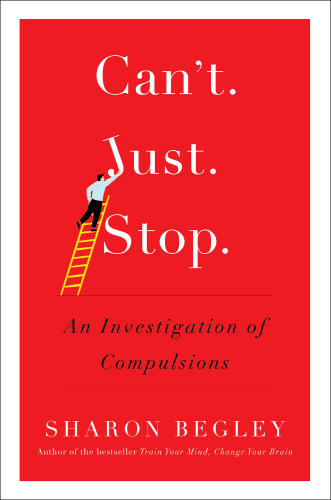
Can't Just Stop
An Investigation of Compulsions
کتاب های مرتبط
- اطلاعات
- نقد و بررسی
- دیدگاه کاربران
نقد و بررسی

October 24, 2016
Science journalist Begley (Train Your Mind, Change Your Brain) demystifies compulsive behavior, exploring its history and manifestations and the many difficulties its sufferers face in finding appropriate diagnoses and treatment. Establishing compulsive behavior as the brain's attempt to assuage anxiety, Begley argues that it can serve a useful purpose. She notes that there are socially acceptable compulsive “quirks,” such as a baseball player who won't change his “lucky” shorts, and that people turn to compulsive habits to feel more in control, a response that is “hardly pathological.” Begley also provides riveting case studies, including a woman who must check her refrigerator repeatedly to ensure that her cat is not inside and a man whose germophobia compelled him to throw out his clothes, shave his head, and abandon his apartment for a series of hotel rooms. A fascinating historical analysis notes references to hoarding in Dante’s Inferno and describes an obsessive Victorian-era book collector. Begley also chats with video game creators about their “addictive” products and expresses a healthy skepticism regarding concerns over widespread compulsive Internet usage. Much of the text summarizes well-known scholarship, but Begley's final chapter on brain function in the compulsive mind contains fresh insight that could fundamentally alter how we think of, and treat, mental illness going forward. Agent: Linda Loewenthal, David Black Agency.

October 15, 2016
Science journalist Begley (Train Your Mind, Change Your Brain, 2007, etc.) delves into specific types of compulsive behaviors while also positing a grand theory of what links seemingly disparate obsessions.The main types of obsessive behaviors the author examines include shopping, hoarding of material possessions, constant checking of smartphones, playing video games nonstop, additional quirks that fall into the realm of obsessive-compulsive disorders, hyper-conscientiousness, and hyper do-gooding. What connects those behaviors, Begley suggests, is living with anxiety in contemporary times. Although clinical anxiety can be difficult to measure, the author cites research that it afflicts about one of every five U.S. adults in any given year, about three times the rate of clinically diagnosed depression. Because Begley frames many compulsive behaviors as somewhat logical responses to severe individual anxieties, she does not find the behaviors as worrisome as loved ones of the anxiety-ridden might find them. After all, writes the author, a compulsive response to anxiety can be viewed as a sensible, if exaggerated, coping mechanism. The case studies she provides, sometimes to the point of overkill, can seem alarming. Yet often those compulsions do not directly harm others and partially cure the anxious individuals. Part of the book's fascination can be found in Begley's personal case study, as she gradually shifts her view about compulsive behaviors from frightening to logical. She came to believe that hoarders, video game obsessives, and the like should be considered outliers in American society only to the degree of their behaviors, not the behaviors themselves. Their brains are not broken, she writes. As a result, the extreme behaviors often do not require institutionalization or other such drastic responses. Due to Begley's dense explanations of brain science, the book requires close attention at times, but her captivating, accessible anecdotes of individual cases lead to unforgettable scenarios.
COPYRIGHT(2016) Kirkus Reviews, ALL RIGHTS RESERVED.

December 1, 2016
Science writer Begley (Train Your Mind, Change Your Brain) delves into the science behind compulsive behavior. While compulsions and addictions are commonly used interchangeably, she describes the differences between the two. She then traces the history of compulsive behavior while including examples. From mild to extreme situations, the case studies and interviews Begley conducted and cites here include compulsions with video games, the Internet, smartphones, exercising, and hoarding. The author also explains the neurology behind compulsions. In addition, she devotes a chapter to altruistic behavior, including acts of generosity and volunteering. An example of such altruistic behavior that she notes is people who donate a kidney to a stranger. Begley emphasizes the stories of the interviewees, while analyzing how compulsions affect society in a fast-paced world. She explains how people can deal with their compulsions and the compulsions of those they care about. Prior science knowledge is not necessary, as this book is written for the general public. VERDICT In this fascinating read, Begley combines a personal topic with thoughtfulness and sensitivity. Recommended for anyone interested in learning more about compulsive behavior.--Tina Chan, MIT Libs., Cambridge
Copyright 2016 Library Journal, LLC Used with permission.

























دیدگاه کاربران